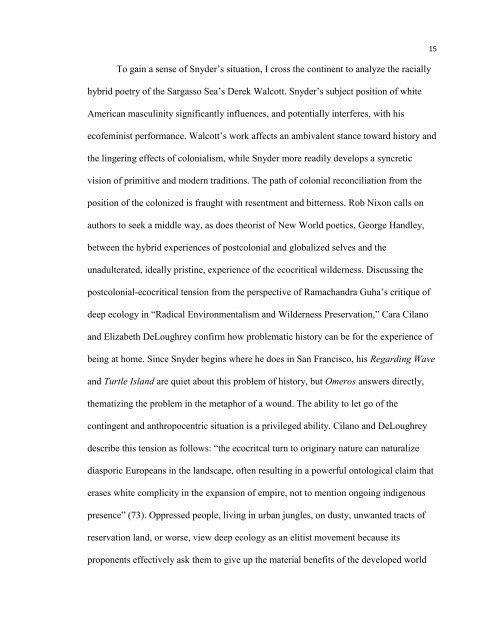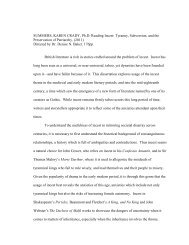RE-INHABITING THE ISLANDS - The University of North Carolina at ...
RE-INHABITING THE ISLANDS - The University of North Carolina at ...
RE-INHABITING THE ISLANDS - The University of North Carolina at ...
You also want an ePaper? Increase the reach of your titles
YUMPU automatically turns print PDFs into web optimized ePapers that Google loves.
To gain a sense <strong>of</strong> Snyder‘s situ<strong>at</strong>ion, I cross the continent to analyze the racially<br />
hybrid poetry <strong>of</strong> the Sargasso Sea‘s Derek Walcott. Snyder‘s subject position <strong>of</strong> white<br />
American masculinity significantly influences, and potentially interferes, with his<br />
ec<strong>of</strong>eminist performance. Walcott‘s work affects an ambivalent stance toward history and<br />
the lingering effects <strong>of</strong> colonialism, while Snyder more readily develops a syncretic<br />
vision <strong>of</strong> primitive and modern traditions. <strong>The</strong> p<strong>at</strong>h <strong>of</strong> colonial reconcili<strong>at</strong>ion from the<br />
position <strong>of</strong> the colonized is fraught with resentment and bitterness. Rob Nixon calls on<br />
authors to seek a middle way, as does theorist <strong>of</strong> New World poetics, George Handley,<br />
between the hybrid experiences <strong>of</strong> postcolonial and globalized selves and the<br />
unadulter<strong>at</strong>ed, ideally pristine, experience <strong>of</strong> the ecocritical wilderness. Discussing the<br />
postcolonial-ecocritical tension from the perspective <strong>of</strong> Ramachandra Guha‘s critique <strong>of</strong><br />
deep ecology in ―Radical Environmentalism and Wilderness Preserv<strong>at</strong>ion,‖ Cara Cilano<br />
and Elizabeth DeLoughrey confirm how problem<strong>at</strong>ic history can be for the experience <strong>of</strong><br />
being <strong>at</strong> home. Since Snyder begins where he does in San Francisco, his Regarding Wave<br />
and Turtle Island are quiet about this problem <strong>of</strong> history, but Omeros answers directly,<br />
them<strong>at</strong>izing the problem in the metaphor <strong>of</strong> a wound. <strong>The</strong> ability to let go <strong>of</strong> the<br />
contingent and anthropocentric situ<strong>at</strong>ion is a privileged ability. Cilano and DeLoughrey<br />
describe this tension as follows: ―the ecocritcal turn to originary n<strong>at</strong>ure can n<strong>at</strong>uralize<br />
diasporic Europeans in the landscape, <strong>of</strong>ten resulting in a powerful ontological claim th<strong>at</strong><br />
erases white complicity in the expansion <strong>of</strong> empire, not to mention ongoing indigenous<br />
presence‖ (73). Oppressed people, living in urban jungles, on dusty, unwanted tracts <strong>of</strong><br />
reserv<strong>at</strong>ion land, or worse, view deep ecology as an elitist movement because its<br />
proponents effectively ask them to give up the m<strong>at</strong>erial benefits <strong>of</strong> the developed world<br />
15
















